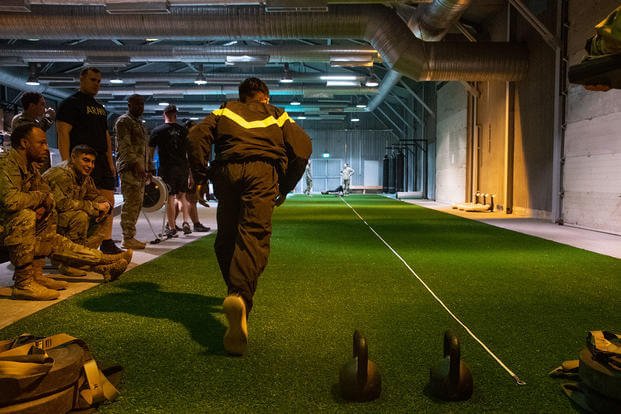The Army is fast-tracking the expansion of its Holistic Health and Fitness, or H2F, program as early results show soldiers in brigades recover faster, shoot better and have higher performance on critical fitness tests with the assistance.
The service began fielding roughly 20-person H2F teams to brigades in 2021, providing 28 brigades with coaches and experts on strength training, sleep, physical therapy, nutrition, postpartum recovery and mental health. By the end of this year, the Army is aiming for 50 brigades and hopes to expand that to 111 brigades by 2027, or about half the active-duty force -- a goal originally set for 2030.
The H2F teams will also be integrated into some National Guard and reserve units throughout the decade. The new fitness resources will also come with a significant investment in gym equipment for the units.
Read Next: Considering Fat-Loss Supplements? New Military Study Finds Many Are Not What They Seem.
"New weapons systems are pointless if you don't have the soldier to man them," Col. Jason Faulkenberry, the H2F program director, told Military.com. "I love seeing this investment in soldiers because we know soldiers will always be used in any future conflict, versus investing in a technology that may or may not be used."
Internal data over the past three years shows promising results.
Behavioral health issues in units with H2F teams are down 14% compared to the rest of the Army, according to data provided by the service. In addition, musculoskeletal injuries are down about 30%.
The service also saw increases in the rate of soldiers passing the Army Combat Fitness Test, or ACFT; a reduction in substance abuse; and even an uptick in troops qualifying as experts in rifle marksmanship.
The positive results come amid a rise in overweight soldiers and musculoskeletal injuries in the Army. The H2F teams are efforts Army leaders have long said are obvious steps forward, setting up a structure that civilians outside of the service probably assume would already be in place.
Until now, it hasn't been easy for a soldier in the conventional Army to get plans from a formally trained coach on improving specific parts of their fitness test, or seek counsel on improving their diet -- resources that the special operations community has enjoyed for years.
Beyond the new initiative, the Army has made strides on how it keeps its troops fit for combat in recent years, with the new ACFT being at the center of that effort.
But the H2F teams and the corresponding doctrine view fitness as intertwined with metrics such as sleep, mental health, nutrition and spiritual health.
"It's not the equipment I get excited about, it's the subject-matter experts that come with the equipment," Sergeant Major of the Army Michael Weimer said at a conference on the H2F program Tuesday. "To be honest with you, later in life I found the importance of the mental and spiritual component. The longer you do this job, the longer those will be at the forefront of your mind. Then the magic pillar -- sleep."
Related: Secretary Wormuth Wants the Army Combat Fitness Test to Stay as Congress Debates Its Fate













